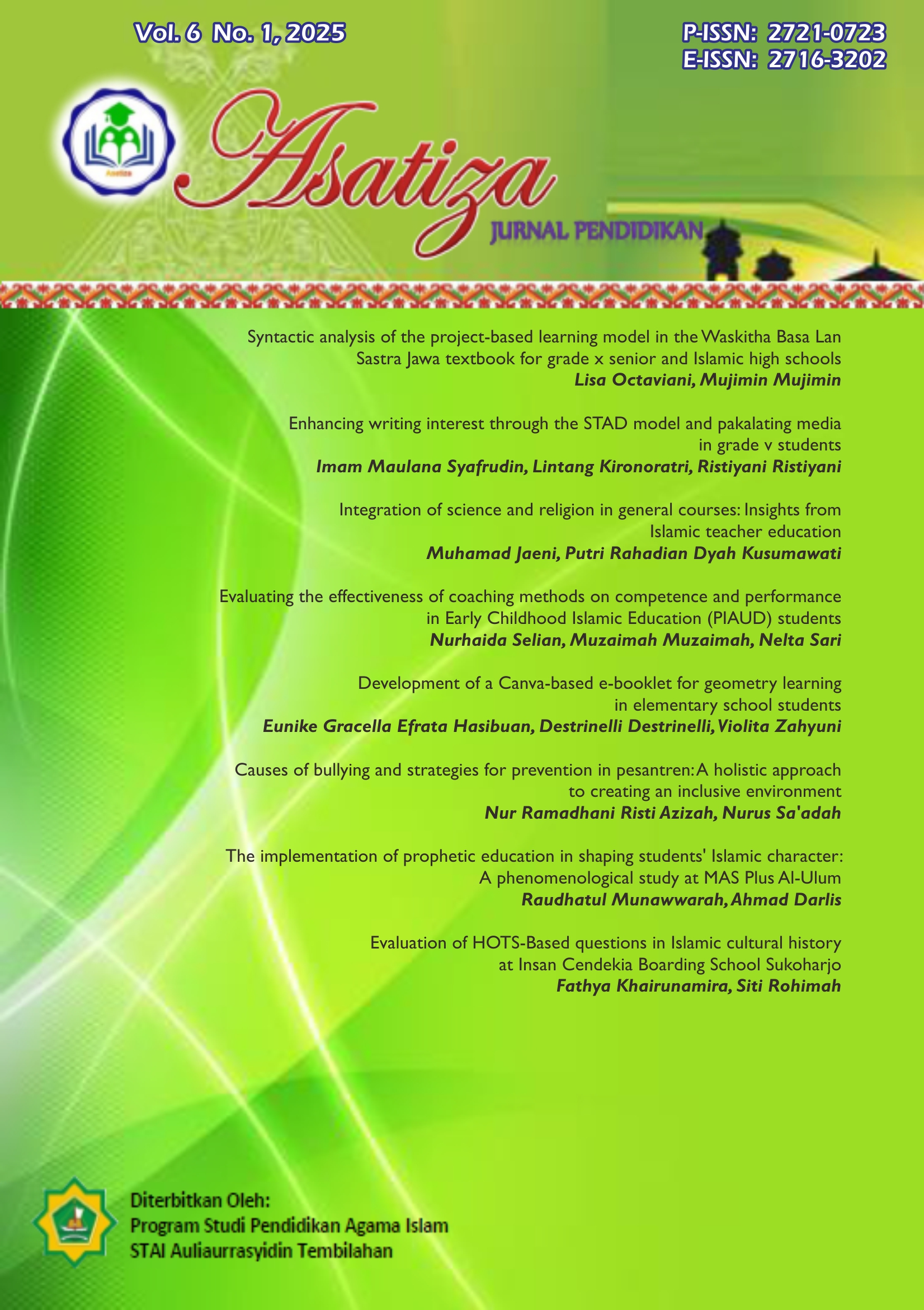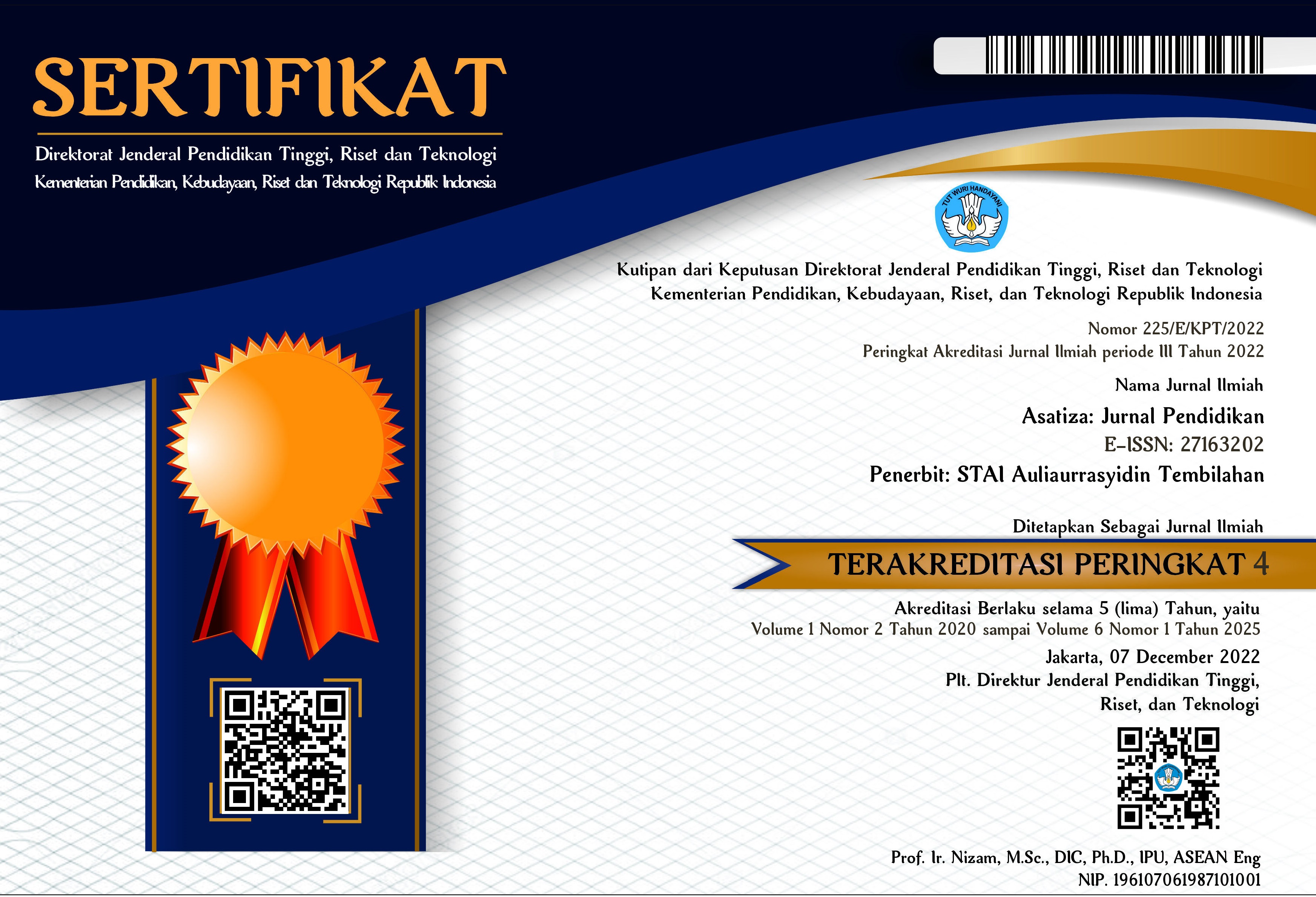The implementation of prophetic education in shaping students' Islamic character: A phenomenological study at MAS Plus Al-Ulum
DOI:
https://doi.org/10.46963/asatiza.v6i1.2609Keywords:
Prophetic Education, Islamic Character, Phenomenological StudyAbstract
Prophetic education plays a strategic role in shaping students' Islamic character by instilling noble values inspired by Prophet Muhammad (peace be upon him) and addressing contemporary moral challenges. This study analyzes the implementation and outcomes of prophetic education at MAS Plus Al-Ulum Medan using a qualitative descriptive approach with a phenomenological perspective. Data were collected through interviews, observations, and document analysis, involving the Head of the Madrasa, the Vice Head for Student Affairs, and the Akidah Akhlak teacher. Findings reveal three key pillars: (1) Transcendence, through Qur'anic memorization, congregational prayers, and religious activities to develop religiosity; (2) Humanization, via mau’izhah hasanah (good advice) and uswatun hasanah (exemplary conduct) to instill moral values; and (3) Liberation, teaching discipline and responsibility through sanctions like Qur'anic memorization and maintaining cleanliness. Prophetic education significantly supports Islamic character development and offers insights for holistic Islamic education models.
Downloads
References
Al-Baihaqi, I. A. B. A. ibn H. (1070). Syu’ab Al-Iman. Al-Maktab Al-Islami.
An-Nawawi, I. (2016). Riyadhus Shalihin: The Gardens of the Righteous. Darussalam.
Creswell, J. W. (2007). Qualitative inquiry and research design: choosing among five approaches (Second edition). SAGE
Hanim, I., Khulaifiyah, S, Sirdjuddin, M. S., Rachmi, T., Nufus, A. S., Raihana, Utami, D. T., Hapsari, W., Umaroh, S. K., & Mardiana, D. (2022). Psikologi Belajar. Wade Group.
Haningsih, S., & Rahayu, P. (2014). Implementasi pendidikan karakter di Madrasah Aliyah Sunan Pandanaran Ngaglik Sleman Yogyakarta (Sebuah kajian dari perspektif pendidikan Islam dan psikologi). Millah: Journal of Religious Studies, 13(2), 217–234. https://doi.org/10.20885/millah.volxiii.iss2.art1
Haris, A., & Fakhruddin, M. (2022). Hakikat pendidik dalam Islam. Jurnal Studi Pendidikan Agama Islam, 4(1), 88–98. https://doi.org/10.54437/ilmuna
Ibn Kathir. (1998). Tafsir Al-Qur’an Al-‘Azhim. Dar al-Kutub al-‘Ilmiyyah.
Kemenag, R. (2019). Al-Qur’an dan Terjemah. Al-Qur’an Dan Terjemahannya Edisi Penyempurnaan 2019.
Kompasdata. (2022). Tindak Kriminal Remaja di Perkotaan. Diakses pada 27 Juli 2024, dari https://data.kompas.id/data-detail/kompas_polling/631401e189c15a605f41980e.
Kuntowijoyo. (2004). Islam sebagai Ilmu: Epistemologi, Metodologi dan Etika. Teraju.
Lutfi, M. (2017). Urgensi Pendidikan Profetik bagi Pendidik. Jurnal Kependidikan, 5(2), 261–278. https://doi.org/10.24090/jk.v5i2.1934
Mansyur, A. Y. (2013). Personal Prophetic Leadership sebagai Model Pendidikan Karakter Intrinsik Atasi Korupsi. Jurnal Pendidikan Karakter, 4(1), 15–27. https://journal.uny.ac.id/index.php/jpka/article/view/1284
Marzuki. (2019). Pendidikan Karakter Islam. Amzah.
Miles, & Huberman. (1994). Qualitative Data Analysis: An Expanded Sourcebook. Sage Publication.
Muhaimin. (2011). Pengembangan Kurikulum Pendidikan Agama Islam di Sekolah, Madrasah, dan Perguruan Tinggi. RajaGrafindo Persada.
Ningsih W., Setiawan, A., & Siva, D. A. N. (2024). Konsep pendidikan profetik dalam membentuk karakter. Semantik: Jurnal Riset Ilmu Pendidikan, Bahasa dan Budaya, 2(1), 305–313. https://doi.org/10.61132/semantik.v2i1.342
Ningsih, W., Febiyani, H., Lelita, L. (2024). Konsep pendidikan profetik (Melacak visi kenabian dalam pendidikan). IHSANIKA: Jurnal Pendidikan Agama Islam, 2(1), 154–162. https://doi.org/10.59841/ihsanika.v2i1.805
Ningsih, W., Sufitriyani, S., & S Sobah, S. D. (2023). Konsep pendidikan profetik sebagai pilar humanisme. ALFIHRIS: Jurnal Inspirasi Pendidikan, 2(1), 234–240. https://doi.org/10.59246/alfihris.v2i1.695
Pratiwi, S. Y., & Usriyah, L. (2020). Implementasi Pendidikan Profetik Dalam Membentuk Karakter Peserta Didik di Sekolah Dasar Al-Baitul Amien Jember. EDUCARE: Journal of Primary Education, 1(3), 243–264. https://doi.org/10.35719/educare.v1i3.40
Ratnasary, J. F. N. A. F., & Purwowidodo, A. (2024). Implementasi Pembelajaran Nilai Profetik dalam Membentuk Karakter Siswa. Edukatif: Jurnal Ilmu Pendidikan, 6(3), 1860-1865. https://doi.org/10.31004/edukatif.v6i3.6568
Robani, A. (2018). Implementasi Pendidikan Profetik dalam Membentuk Karakter Siswa di MTs Negeri 6 Sleman, Yogyakarta. Universitas Islam Indonesia. https://dspace.uii.ac.id/handle/123456789/7892
Roqib, M. (2013). Pendidikan karakter dalam perspektif profetik. Jurnal Pendidikan Karakter, 4(3), 240-249. https://doi.org/10.21831/jpk.v0i3.2747
Subardi, J. J. S. (2022). Implementasi dan Hasil Pendidikan Profetik dalam Membentuk Karakter Siswa di MTsN 10 Sleman. Universitas Islam Indonesia. https://dspace.uii.ac.id/handle/123456789/44405
Umar, B. (2022). Hadis Tarbawi: Pendidikan dalam Perspektif Hadis Nabi Muhammad Saw. Bumi Aksara.
Zubaedi. (2013). Desain Pendidikan Karakter: Konsepsi dan Aplikasinya dalam Lembaga Pendidikan. Kharisma Putra Utama.
Downloads
Published
Issue
Section
License
Copyright (c) 2025 Raudhatul Munawwarah, Ahmad Darlis

This work is licensed under a Creative Commons Attribution-ShareAlike 4.0 International License.
Authors who publish with this journal agree to the following terms:
1. Copyright on any article is retained by the author(s).
2. The author grants the journal, right of first publication with the work simultaneously licensed under a Creative Commons Attribution shareAlike 4.0 International License that allows others to share the work with an acknowledgment of the work’s authorship and initial publication in this journal.
3. Authors are able to enter into separate, additional contractual arrangements for the non-exclusive distribution of the journal’s published version of the work (e.g., post it to an institutional repository or publish it in a book), with an acknowledgment of its initial publication in this journal.
4. Authors are permitted and encouraged to post their work online (e.g., in institutional repositories or on their website) prior to and during the submission process, as it can lead to productive exchanges, as well as earlier and greater citation of published work.
5. The article and any associated published material is distributed under the Creative Commons Attribution-ShareAlike 4.0 International License











2.png)



